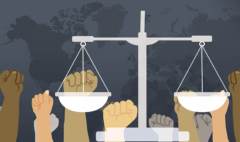The social contract tradition
Let’s imagine that we live in a society in which everyone kills each other for any reason. Of course, we would all like to stop this lawlessness and for this we would appoint someone who will have to punish the criminal according to the law, let’s call him the head of the executive branch or the president. But if this had not happened, the killings would have stopped, because someone, let’s call him the king, began to kill in an organized manner, both the killers themselves and potential killers, so to speak, enemies of the fatherland, that is, all those who are not afraid or in something disagrees with the existing government.
Formally, the arbitrary assassination problem will be solved in both cases, but in the first case, the president has the right to kill only assassins. And in the case of the king, the latter has the right to kill everyone without asking the permission of the others. In the first case, we have a tradition of the rule of law, based on the right that we voluntarily endowed the president, in the second, a right based on strength and fear of the king. It is difficult for me to call the latter a social contract; rather, it is a natural, understandable process.
Society always either supports the social contract, however, if this does not happen, it inevitably submits to authoritarian force, that is, the threat of being killed, and so in the event of an encroachment not only on the right to kill, but also on any of their own rights in general. These are opposite legal systems.
But what does “social contract” mean, for example, in the appointment of a president? In essence, this is a kind of idea about what should be done and how, what should be done and how, in order for this right to work. In particular, having elected a president, the people must obey him, just as the president himself must obey the law and the obligations assumed.
The social contract in this sense will only work to the extent that we are able to fulfill such obligations to each other. Since such an ability is obviously not given to everyone in the same way. The organization of such a treaty should be carried out only by those who will be capable of it.
Social contract “Open Money”
Let’s now return to real life and at the same time, let’s say that the problem of disenfranchised murder has been resolved, we have a legal authority and a president, to whom we can object by creating competition in the elections, offering one or another better solution. But what is this solution, on what problem? Can we offer not an improvement of what is, but a radically new solution?
You say, everything has already been invented, there is a constitution. I agree, but let’s ask ourselves the question: “Are her theses really so essential in people’s daily lives?”. Of course, no one would want to be killed or become someone’s slave, etc. which directly violates the constitution. This is certainly a problem, but aren’t all or most of these problems solved? Or did they not dare to achieve prosperity, that is, thanks to the economy? Is it not for the sake of all the same well-being that most crimes are committed? When we see that a person can be brought to an essentially slavish state in a completely legal, economic way.
And if we adopted a constitution, that is, we have a president, and not a king or another dictator, then this means that the social contract has already been concluded in many respects, we have various laws and more or less for the most part strive to comply with them, etc. So the only thing we need is to make everything work as it should. But the fact of the matter is that we cannot force, sometimes we cannot force even ourselves or our relatives to do something useful, what can we say about power. In general, forcing someone to perform any action is a thankless task, it is better to do it yourself, replacing power with yourself.
And of course, I am not opposed to well-functioning existing state institutions, and yet they have genetic flaws that cannot be corrected without offering perfect ways of interaction, which is the ML system.
The OM system is a new, more effective social contract, not about rights, but about obligations to each other, it formalizes and saves them in digital form. The tradition of the public contract of open money can be said to work from democracy in conditions of some freedom, when at least an ordinary person like me has the right to offer alternatives, on an equal basis with everyone.
Politics begins
Since we live in a democracy and everyone has their own interests and their own decisions on how to do it. My task is to even politics – highlight the common in this one. The problem here is that in most cases, “one’s own” is exclusively personal wealth, which cannot be united and ensured, except by endowing a certain loyal group of people with power or even greater rights. But, as in the case of the president, we must unite not desires arising from personal interest, but obligations to comply with laws, to respect our own and others’ rights.
Why should the fulfillment of obligations, in itself, be desirable? It must be of some personal interest, to give opportunity to improve your life. To this end, an economy is being created in the OM system, where everyone, by observing obligations, can improve their lives. Thus, the social contract of open money will work for everyone who is ready to get results on their own.


